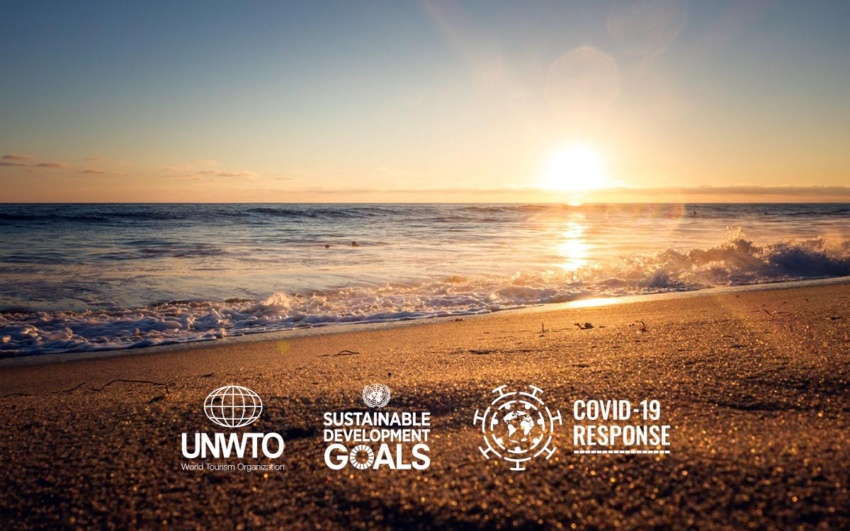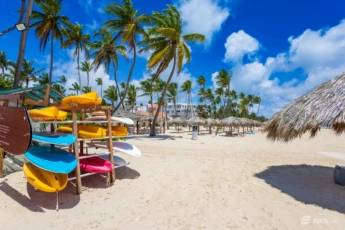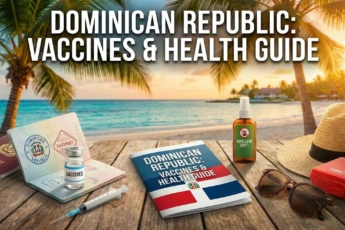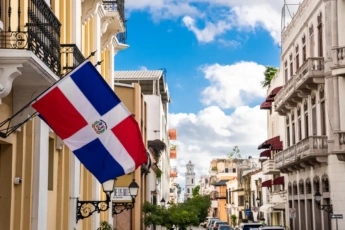Safe Travels Protocols (UNWTO, WTTC) – Rules & Requirements for Tourism after COVID-19

Safe Travels Protocols in the Dominican Republic
At the end of May 2020, the World Tourism Organization (UNWTO) issued a document with global recommendations for restarting tourism, which can be applied in our company of Everything Punta Cana and the Dominican Republic as well. In order for us to minimize losses and restore the Dominican tourism after the coronavirus crisis, all market participants have to adhere to the new requirements of the time, creating safe conditions at every stage of travel.
The World Tourism Organization (UNWTO), together with WTTC and other worldwide organizations, has developed a special Safe Travels Protocol, a label on compliance with which is given to countries and cities that have introduced new requirements to ensure the safety of tourists after the coronavirus pandemic. And this label as you can see is given to our company too!
The World Tourism and Travel Council (WTTC) – is an international non-governmental organization that includes representatives of tourism companies from around the world. In total, WTTC consists of more than 200 companies (travel companies and associations, hotel chains, cruise companies, etc.) with a turnover of more than $500 billion, which together represent about 30% of the global tourism industry, the association’s website says. WTTC defends the interests of its members, is engaged in research in the field of tourism and the dissemination of information about its trends and problems.
The protocols are designed for hotels, restaurants, airlines, train stations and airports and other agencies and organizations from the tourism industry. They provide for new rules for the disinfection of premises, the introduction of contactless technologies and social distance of clients and guests.
The new UNWTO rules are aimed at helping countries and all participants in the global tourism market begin to move towards a sustainable recovery of the industry in order to emerge stronger from an unprecedented crisis. Our priority should be to restore tourist confidence. In addition to ensuring risk-free travel, we must take into account recommendations to use innovative technologies to minimize physical contact, as well as to provide reliable, consistent and affordable communication with all participants in the process.
The COVID-19 pandemic clearly showed that the economies of lots of countries are very dependent on the tourism industry. A few months, during which the sightseeing life of travelers around the world practically stopped, caused great harm to all market participants. That is why today, ordinary citizens and businesses of many countries require their governments to return to normal life, which in this case means opening borders, restoring flights, launching tourist facilities, and the like.
These steps are very expected, but it is clear that we need to move towards the recovery of the industry gradually, bearing in mind the risks that non-compliance with the basic safety rules carries.
Safe Travels Protocols hierarchy in the Dominican Republic
| Level | Organization | Protocol | Description | |
|---|---|---|---|---|
| 1. | Worldwide | UNWTO | Global Guidelines to Restart Tourism and Priorities for Tourism Recovery | The first set of global recommendations to support jobs and economies through tourism. More information → |
| 2. | Worldwide | WTTC | Leading global protocols for the new normal hospitality | Global Guidelines for tourism worldwide. Base for government guidelines. More information → |
| 3. | Government | Ministry of Tourism | Protocolo general de actividades turísticas | Government Guidelines for tourism in the Dominican Republic. Base for local guidelines. More information → |
| 4. | Local Business | Everything Punta Cana LLC | COVID-19 Safety Protocol from Everything Punta Cana LLC | Our own Protocol based on global and Government guidelines above. |
Global recommendations for restarting tourism
UNWTO recommendations aim to support governments and the private sector in restoring tourism after quarantine restrictions have been lifted. Based on intersectoral expertise, the main priorities were identified, which are based on the need to mitigate economic impact, develop security protocols, ensure regional and international coordination and stimulate innovation.
Global recommendations relate to the safe opening and functioning of borders, safe air travel and accommodation at destination, the work of tour operators and agents. They also draw lines recommended by countries and relevant government agencies to help the industry put these recommendations into practice.
At the level of the Dominican Republic and interstate cooperation, coordinated work is very important. This applies, first of all, to a clear definition of the roles and areas of responsibility of governments, businesses (the private sector) and travelers.
Protocols and procedures should be adopted in accordance with risks, the assessment of which is based on evidence from leading international health authorities, and travel restrictions themselves should be regularly reviewed to ensure that they remain proportional to the threat to public health. It is understood that protocols and procedures related to travel and tourism should be harmonized globally.
The logical requirement of the time, the application of which the crisis has only accelerated, is also the recommendation to use technology for safe and contactless travel. Recent months have shown that the role of technologies in our lives has significantly increased, and they should be used for contactless payment, pre-booking activities, communication between the service provider and the consumer, and the like. A further digital transformation of tourism will make the industry more sustainable and create new opportunities for people around the world.
All the steps involved are important to ensure reliable information support. Information on all protocols, travel restrictions, as well as their gradual removal should be simple, consistent and accessible for both business and travelers.
Recommendations for tourism safe restoration in the DR
Recommendations for the safe restoration of the tourism of the Dominican Republic are quite obvious and are based on the principles of common sense. Measures for the safe functioning of the industry participants have already been introduced in one way or another – at airports, on board aircraft, in accommodation facilities:
- Global health, safety and hygiene protocols apply.
- Health screening procedures are being introduced.
- Expanding space to provide physical distance.
- The frequency of cleaning increases, new methods of disinfection are used.
- A plan is developed in case of illness of a tourist or employee.
- Processes are moving towards digital contactless operations (online payments and pre-booking services are encouraged).
Our own Safe Protocol implementation experience
Our company always focuses on its guests! Therefore, this pandemic has become a real challenge. We always keep our finger on the pulse and follow the official recommendations of WHO, WTTC, the Dominican Government, the Ministry of Health, and the Ministry of Tourism. We continue to work in a limited mode and comply with all recommendations, because we provide properties for people who weren’t able to leave the Dominican Republic because of the pandemic and closed borders. After the protocols from WTTC and the Center for Disease Control and Prevention appeared, we immediately examined and applied them! Also based on them we have created our own protocol.
The below suggested rules for hospitality were compiled based on input from leading hospitality companies either directly or from their public announcements around the safe, healthy and responsible reopening of hotels to the public. The rules also take into account WTTC, World Health Organization (WHO) and the Center for Disease Control and Prevention (CDC, El Centro de Control y Prevención de Enfermedades) guidelines. The objective is to ensure that rules are in place across all relevant functions with an increased focus on health, safety and social distancing guidance which travellers will need and expect.
Based on these generalized measures, our company must implement specific measures and procedures to guarantee the health of employees and the rest of the community. In this sense, ministries related to reopening, sector ministries and business associations worked together to design the relevant protocols for each economic activity so that the gradual reactivation minimizes the risk. We implemented:
- Deep cleaning and social distance using special visual markers.
- Using of face masks and temperature scanning with a non-contact infrared thermometer.
- Using of digital cards and virtual purchases.
- Promotion of contactless payments, email receipts and free WIFI.
- Disinfection of TVs, switches, and door handles.
- Hand sanitizer at the entrances and exits, at the properties.
- The rules of social distance.
Our reception staff is trained to inform clients about the application of this protocol, medical or pharmaceutical services that they may require. As well as the isolation protocol to follow in case it presents high temperatures or if they have declared any suspicious symptoms or risky contact.
Every day we measure the temperature of our staff at the beginning of the working day. If the employee has symptoms of the disease or his/her body temperature is measured and it is higher than 37.9 C, we must send him/her home or to the doctor. After the sick worker leaves the workplace, we must definitely air all the rooms in which he/she was. We will have to distribute alcohol wipes for office equipment to employees to wipe all surfaces that the sick employee touched. If the employee confirms the coronavirus, we undertake to remove from the work all the staff who contacted him/her.
We have posters with visual campaigns in public spaces, such as hallways, lobbies, receptions, rooms, etc. on the health and safety measures taken in the establishment, as well as the mandate of frequent hand washing, use of antibacterial gel and respiratory hygiene and cough etiquette.
We are deeply concerned about the current travel situation around the world, and therefore must restore the confidence of the traveler! We must avoid the confusion and uncertainty that prevails in the market.
We need to make sure that the tourism industry “speaks the same language” and that every consumer understands what the safety of an apartment means, regardless of location. Having the appropriate protocol at our company will allow consumers to recognize the same safety standards, wherever they are!
Government support of tourism industry after COVID-19
The government’s tourism policy plays a key role in restoring the industry, its willingness to cooperate with the private sector and support the implementation of new protocols and effective procedures in proportion to the risks involved.
Obviously, in 2020 – due to restrictions on the entry of foreigners by various countries, as well as due to economic factors – the demand for foreign travel will decrease. Most countries reorient to the domestic market. In the Dominican Republic, this is still being done mainly at the level of tour operators, but it is important that the state participates in the promotion of domestic tourist destinations.
According to global trends, it is relevant to request individual tourism or tourism in small groups, focused on obtaining new experiences (ecotourism, city breaks, gastronomic tours, sporting events, other highly specialized trips). Here, the role of the Dominican Republic is to promote the country’s image at the national level, to encourage such travels, as well as to provide comprehensive support, including information, to business and tourists: to keep abreast of national and regional medical protocols, to make available information on current contacts of healthcare institutions and things like that.
As the conclusion: the importance of coordinated work
Summing up all the above, we would like to emphasize once again the importance of coordinated work of all players in the world and the Dominican hospitality and tourism market. It is necessary to attract state support, including financial support, to ensure coordination between governments, airports, airlines, tour operators, hoteliers, etc., to establish cooperation with companies that provide medical, insurance or other services related to ensuring hygiene and safety.
In the short term – focus on domestic tourism, promote new destinations and new experiences, be inspired by the local in creating a tourism product. By coordinated gradual actions, we will be able to recover from the crisis and return the industry to active growth rates.
Updated on: . Author:



